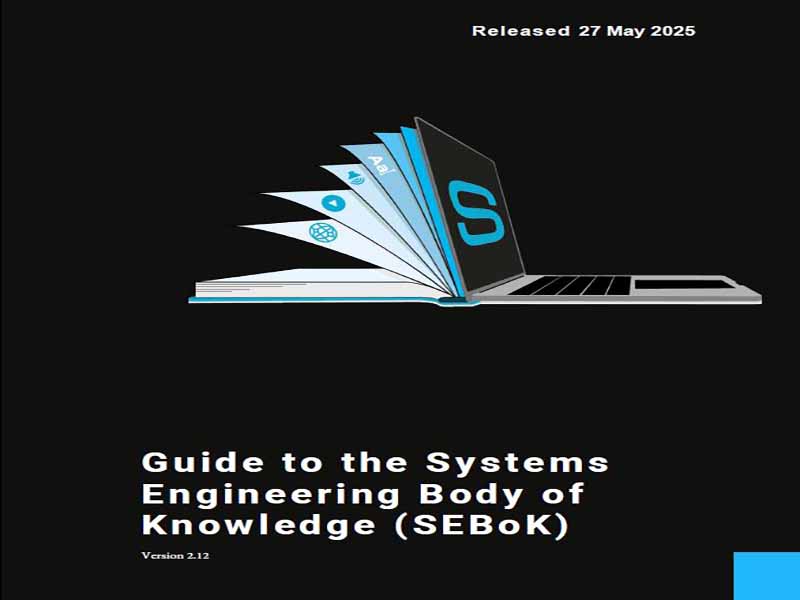- عنوان کتاب: Guide to the Systems Engineering Body of Knowledge (SEBoK)
- نویسنده: Nicole Hutchison
- حوزه: مهندسی سیستم
- سال انتشار: 2025
- تعداد صفحه: 1310
- زبان اصلی: انگلیسی
- نوع فایل: pdf
- حجم فایل: 20.5 مگابایت
راهنمای پیکره دانش مهندسی سیستمها (SEBoK) یک راهنمای معتبر و زنده است که دانش مربوط به مهندسی سیستمها را مورد بحث قرار میدهد. این راهنما تعریف میکند که چگونه این دانش باید برای تسهیل درک، ساختاربندی شود و کدام منابع مرجع برای این رشته مهمتر هستند. راهنمای برنامه درسی در برنامه درسی مرجع تحصیلات تکمیلی برای مهندسی سیستمها (GRCSE) (Pyster and Olwell et al. 2015) به بخشهایی از SEBoK اشاره میکند تا دانش اصلی آن را تعریف کند. همچنین نتایج و اهداف برنامه گستردهتری را پیشنهاد میدهد که منعکس کننده جنبههایی از عملکرد حرفهای مهندسی سیستمها است که در سراسر SEBoK مورد بحث قرار گرفته است. بین سالهای ۲۰۰۹ تا ۲۰۱۲، BKCASE توسط موسسه فناوری استیونز و دانشکده تحصیلات تکمیلی نیروی دریایی با هماهنگی چندین انجمن حرفهای و با حمایت وزارت دفاع ایالات متحده (DoD) که بودجه سخاوتمندانهای را ارائه میداد، رهبری میشد. بیش از ۷۵ نویسنده و بسیاری از داوران و حامیان دیگر از دهها شرکت، دانشگاه و انجمن حرفهای در ۱۰ کشور، هزاران ساعت در نوشتن مقالات SEBoK مشارکت داشتند. سازمانهای آنها کمکهای قابل توجه دیگری نیز به صورت غیرنقدی ارائه دادند. SEBoK با این تشخیص ایجاد شد که رشته مهندسی سیستمها میتواند با داشتن یک راهنمای معتبر و زنده که ارتباط نزدیکی با گروههایی دارد که در حال توسعه راهنمایی برای پیشبرد عمل، آموزش، تحقیق، توسعه نیروی کار، صدور گواهینامه حرفهای، استانداردها و غیره هستند، بسیار سودمند باشد. در آغاز سال 2013، BKCASE به یک مدل حاکمیتی جدید با نظارت مشترک بین مرکز تحقیقات مهندسی سیستمها (SERC) [1]، شورای بینالمللی مهندسی سیستمها (INCOSE) [2] و انجمن کامپیوتر موسسه مهندسان برق و الکترونیک (IEEE-CS) [3] منتقل شد. این ساختار حاکمیتی در یک تفاهمنامه بین سه نهاد ناظر که در بهار 2013 نهایی و متعاقباً بهروزرسانی شد، رسمیت یافت. در ژانویه 2020، شورای سیستمهای IEEE [4] جایگزین IEEE-CS شد و IEEE را به عنوان یک نهاد ناظر معرفی کرد. این نهادها تعهد خود را برای در دسترس قرار دادن رایگان SEBoK برای همه کاربران، که یک اصل کلیدی BKCASE است، مجدداً تأیید کردهاند. تا پایان سال ۲۰۲۴، مقالات SEBoK بیش از ۸.۶ میلیون بازدید صفحه از بیش از ۳.۵ میلیون بازدیدکننده منحصر به فرد داشتهاند. ما امیدواریم که SEBoK به طور منظم توسط هزاران مهندس سیستم و دیگران در سراسر جهان مورد استفاده قرار گیرد، زیرا آنها فعالیتهای فنی مانند استخراج الزامات، ایجاد معماری سیستمها یا تجزیه و تحلیل نتایج آزمون سیستم و فعالیتهای توسعه حرفهای مانند توسعه مسیرهای شغلی برای مهندسان سیستم و تعیین برنامههای درسی جدید برای برنامههای دانشگاهی مهندسی سیستمها را انجام میدهند.
The Guide to the Systems Engineering Body of Knowledge (SEBoK) is a living authoritative guide that discusses knowledge relevant to Systems Engineering. It defines how that knowledge should be structured to facilitate understanding, and what reference sources are the most important to the discipline. The curriculum guidance in the Graduate Reference Curriculum for Systems Engineering (GRCSE) (Pyster and Olwell et al. 2015) makes reference to sections of the SEBoK to define its core knowledge; it also suggests broader program outcomes and objectives which reflect aspects of the professional practice of systems engineering as discussed across the SEBoK. Between 2009 and 2012, BKCASE was led by Stevens Institute of Technology and the Naval Postgraduate School in coordination with several professional societies and sponsored by the U.S. Department of Defense (DoD), which provided generous funding. More than 75 authors and many other reviewers and supporters from dozens of companies, universities, and professional societies across 10 countries contributed many thousands of hours writing the SEBoK articles; their organizations provided significant other contributions in-kind. The SEBoK came into being through recognition that the systems engineering discipline could benefit greatly by having a living authoritative guide closely related to those groups developing guidance on advancing the practice, education, research, work force development, professional certification, standards, etc. At the beginning of 2013, BKCASE transitioned to a new governance model with shared stewardship between the Systems Engineering Research Center (SERC) [1], the International Council on Systems Engineering (INCOSE) [2], and the Institute of Electrical and Electronics Engineers Computer Society (IEEE-CS) [3]. This governance structure was formalized in a memorandum of understanding between the three stewards that was finalized in spring of 2013 and subsequently updated. In January 2020, the IEEE Systems Council [4] replaced the IEEE-CS in representing IEEE as a steward. The stewards have reconfirmed their commitment to making the SEBoK available at no cost to all users, a key principle of BKCASE. As of the end of 2024, SEBoK articles have had over 8.6M pageviews from more than 3.5M unique visitors. We hope the SEBoK will regularly be used by thousands of systems engineers and others around the world as they undertake technical activities such as eliciting requirements, creating systems architectures, or analyzing system test results; and professional development activities such as developing career paths for systems engineers, and deciding new curricula for systems engineering university programs.
این کتاب را میتوانید بصورت رایگان از لینک زیر دانلود نمایید.
Download: Guide to the Systems Engineering Body of Knowledge (SEBoK)





































نظرات کاربران